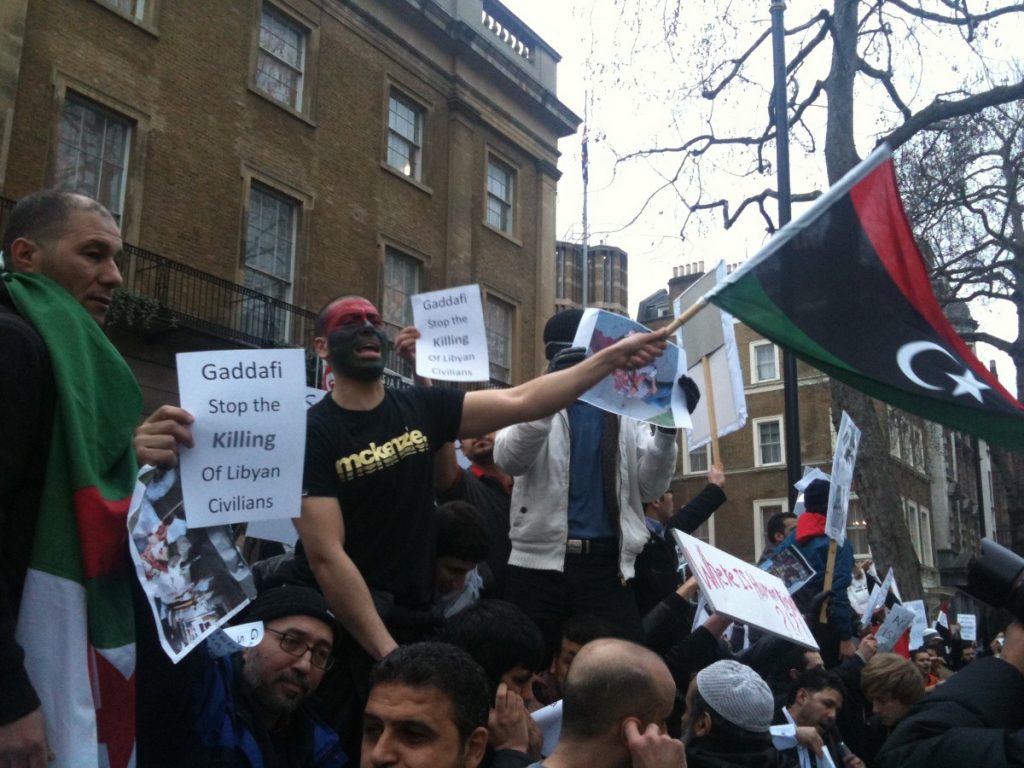Eyewitness: Libyan exiles demonstrate in London
On the streets with Libyan demonstrators in London as Gaddafi prepares to fight his ground.
By Ian Dunt
It’s like speaking to a wall of unmitigated emotion. The protesters outside Downing Street were a sea of faces, each as bitter and disturbed as the next. The veins on their necks bulged as they spoke, their voices trembling. It was the most passionate demonstration I have ever seen.
The noise could be heard in politics.co.uk‘s offices in parliament, from down Whitehall. Disciplined all-male chanting stirs a uniquely unsettling feeling. It communicates with that animal part of the brain which alerts you to danger. The packs of men worked their way down to outside Downing Street waving flags, leaving tourists and office workers curious and wary.


The protest was split in two, with women on the right and men on the left. On the far left, the group became more mixed, with a Stop The War banner marking out the start of a more secular, traditional demo. But this was not some brow-beaten collection of women, shifted irrelevantly to one side. They stood with their heads up high, handing out leaflets, collecting money, leading chants. At the front, a young girl – she couldn’t have been more than ten – stood with a brightly coloured ‘I Love London’ hoodie, leading the crowd in chants.
“Britain, America, whoever – we have tried to tell them about this for many years,” said Fathi Elmehdwi, a man who had campaigned for change in Libya for three decades. “No-one believed us. It’s about time to listen to us and know what’s happening to the Libyan people. In the end we just want to live in harmony. We want our country to be as democratic as Britain, as any civilised country.”
I walked across from the crowd – I’d put it at 2,000, although it may have been smaller – passing the sea of angry, tearful faces. Many of them told me they couldn’t get hold of their families. Others daubed their face with paint and grasped flags, which they waved above their heads like extras in some historic film. All the paraphernalia of protests were there. The face paint, the chants, the flags, they are so common in protests that they hid, rather than revealed, this demonstration. They are the trappings of what protests usually are.
But this was much more. It was a combination of political demands, spontaneous need for action and a form of brutal group therapy. Most of their complaints about the British government were unfair, but that background disillusion held true. Blair’s visit to Gaddafi’s tent, the decision over Megrahi, the lack of concerted international action to stop the massacres, the prime minister’s trip to the Middle East complete with arms dealers in tow – they formed a background chorus to their intuitive understanding of international relations, that the west has always cared more about money than it does about Arab blood.
“Let people demonstrate. If they want to express their right of freedom of speech, why do you need to send aircraft to kill demonstrators? I never heard of this before,” Nureddin Waheishi, told me. Next to him, his son, wearing an identical jacket and haircut, seared with indignation. “We’re scared. We’re a scared people because of this dictator. He’s a murderer.”
I asked him how I should describe him in the copy. “I am,” he started, and then hesitated. A smile passed his lips. “A British Libyan.”
There is always something vulnerable and pathetic about demonstrations against events overseas, because there is plainly no chance of them succeeding. Their demands are even more unlikely to succeed than those of normal protests. But they are also more beautiful and undiluted, as people hit the streets not out of calculation, but from need. Do they blame Downing Street for events in Libya? Not really. They just can’t sit at home anymore, isolated, watching their families and friends destroyed by a mad man. You could feel their indignation on your skin, like heat.

